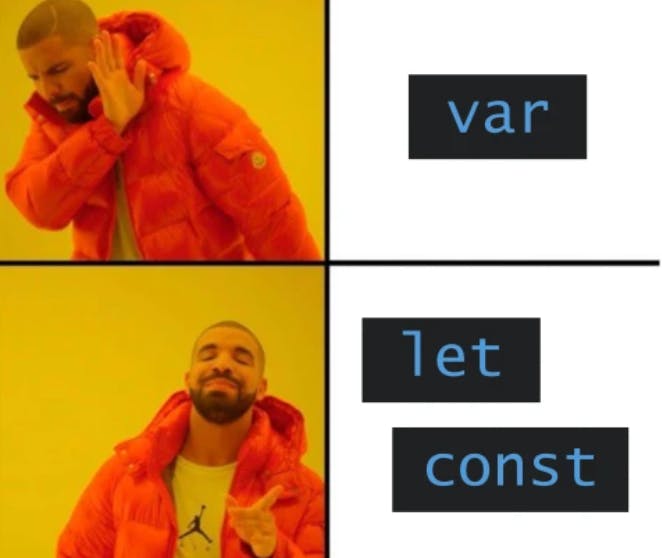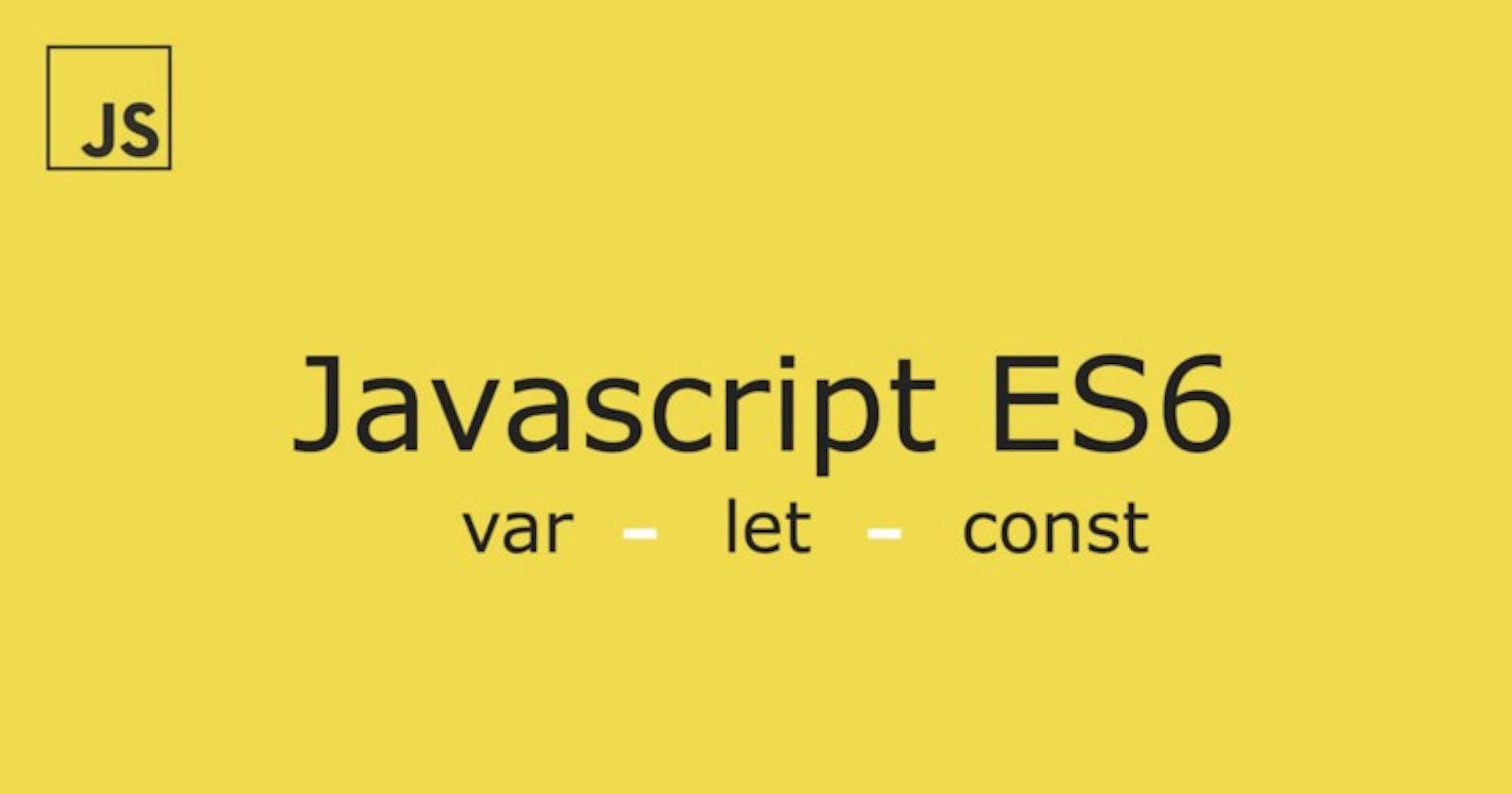Introduction to variables
Javascript is a dynamically typed language and hence there is no need to define the datatype of a variable. But we use three keywords to declare a variable in javascript var, let, and const.
var a=6;
let b=6
const c=6;
Accessing the above variables using console.log() method.
console.log(a); //6
console.log(b); //6
console.log(c); //6
Accessing variables without assigning them
Now, let's check what happens if we access those variables without assigning some value
var p;
let q;
const r;
console.log(p); //undefined
console.log(q); //undefined
console.log(r); //SyntaxError: Missing initializer in const declaration
We should declare and initialize the const variable in one single line.
Undefined and Not defined?
Undefined and Not defined are not the same in javaScript.
var p=20;
console.log(p) // undefined
console.log(s); // ReferenceError: s is not defined
Undefined - It is a reserved keyword in javascript. Everything which gets space in the memory will assign to "undefined" until we assign some actual value to it.
Not defined - Accessing variables even before declaring them in the code will give a "not defined" error.
Accessing the variables before declaring
console.log(a); // undefined
console.log(b); //ReferenceError: b is not defined
console.log(c); //ReferenceError: c is not defined
var a=4;
let b=5;
const c=6;
How do "var" and "let" behave differently? How "var a" is giving undefined even when we have not declared the variable before using it? When "var a" is giving undefined, Then how "let and const" are giving us reference error?
Are you also pondering over similar questions? Let's move ahead to solve this mystery.
Accessing variables that are not declared in the code gives an error because of TDZ
What is TDZ or Temporal Dead Zone?
Hoisting - Javascript hoists all the variables, functions, and classes on top of their scope before the code execution starts.
Temporal Dead Zone - It is the area/ block/ zone where the variable is hoisted but not assigned to any value and they are temporarily unavailable in that scope.
A little background story, Every javascript code goes through two phases:-
- Memory allocation phase
- Code execution phase
var a=6;
Memory creation phase - Every variable and function in the code will get some space in the memory and a special keyword "undefined" is assigned to variables whereas, the functions will store the function body directly in the Memory creation phase.
a = undefined //in memory creation phase
Code execution phase - In the Code execution phase, Code executes line by line. And the variables will get assigned to their respective values (which are defined in the code).
a = 6 //in code execution phase
Now, Let's go back to the same question again:- When all the variables and functions are hoisted then how come "var a" was giving undefined and "let and const" were giving us reference error?
Do variables from let and const really get hoisted?
Yes. Variables declared from all three keywords(var, let, and const) get hoisted and assigned to the undefined keyword. But "let and const" follows a strict principle and gets saved in the script scope. Even though they are assigned to undefined (like var) they are not accessible without assigning a value to them. And that's when they become temporarily unavailable and fall into a dead zone(TDZ). Whereas, "var" variables are hoisted and saved in a global scope. Hence they are accessible even without assigning an actual value to them.

If you look at the above image of the console debugger, then you can see that let and const are stored in the script scope. Whereas, var is stored in the global scope.
Var is cool. Isn't it? We can access it anytime, anywhere. But it comes with a lot of disadvantages.
Disadvantages of var declared variables
We can redeclare the same variable using
var.var a=10; var a=100;This is a problem, as we tend to change the essential variables as well. Example- let's take an example of a bank account what if the balance amount variable is declared with
var. Then, it can easily be redeclared as 0 even though we have money in our account. It's a little dangerous.We can access
varvariables without even assigning an actual value to itconsole.log(a) //undefined var a=6varvariables in for loop continue to remain in their state even after the termination of for loopfor(var i=0; i<3; i++){ console.log(i); //0 1 2 } console.log("outside",i); // outside 3varvariables inside the if statement get hoisted to the parent scope which is the global scope. So, even thevarvariables insideifstatement is accessible everywhere.
What's next?
Introducing const and let variables
Let variables
- We cannot redeclare
letvariables. But always re-assign a value whenever needed.let a=4; a=5; //valid let a=10; //SyntaxError: Identifier 'a' has already been declared letvariables have ablockscope, so they are not accessible outside the block{ }if(true){ let a=4; } console.log(a); //undefined- As
letvariables haveblock scope, they are not even hoisted in the parent scope. They maintain their own block, even while hoisting.

Do we need const variables as well?
Yes. At times we don't want the variable, array, or an object to change its property and value. So, we use const because
constvariables are not allowed to re-assign or re-declare a variable.const apple=7; apple=4; //TypeError: Assignment to constant variable.constvariables are declared and initialized at the same time.const papaya=1; const apple; //SyntaxError: Missing initializer in const declaration- Rest of the properties of
constdeclared variable are same asletvariables.
Difference between var, let, and const
Reason
| Var |
Let |
const |
|---|---|---|---|
| Accessibility of Variable | Functional Scope | Block Scope | Block Scope |
| Declaration without initialization | Allowed | Allowed | Not allowed |
| Declaration and Assignment | Can be re-declared and re-assigned within the scope | Cannot be re-declared but can be re-assigned within the scope | Cannot be re-declared or re-initialized in the scope |
| Accessed without initialization | Yes. Allowed | Not Allowed because of TDZ | Not allowed because of TDZ |
Conclusion

- Try using
constas it is error-prone. - Use
letif you need to change the value in between the code. - Try to avoid
var.
